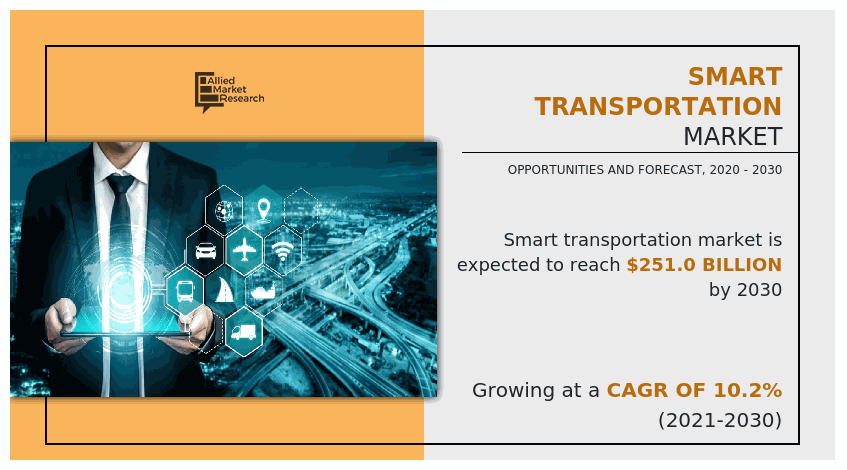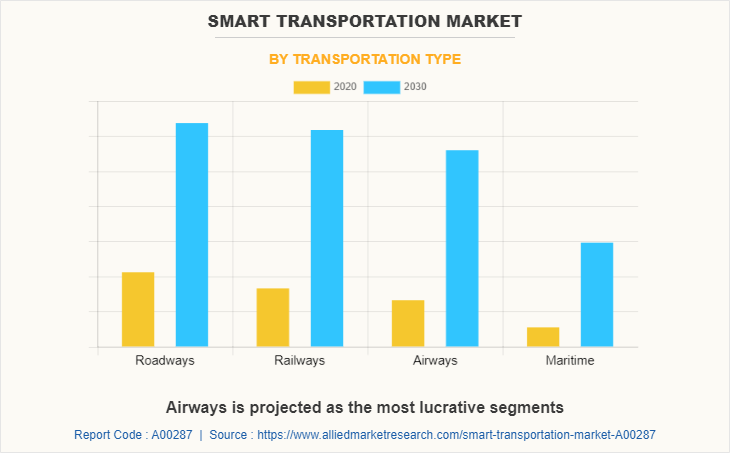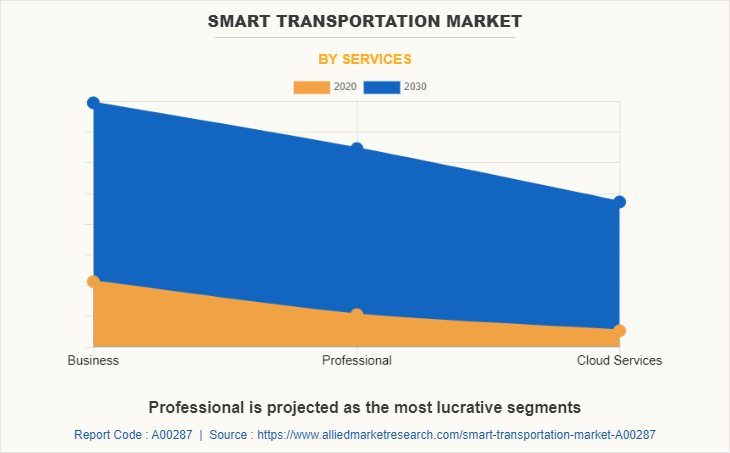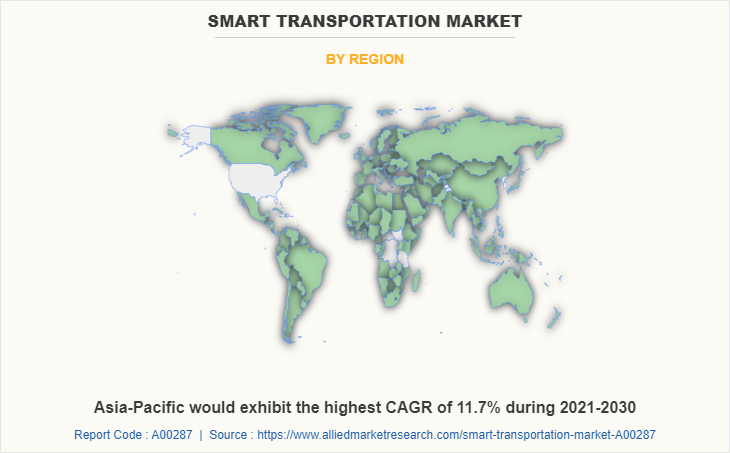Smart Transportation Market Insights, 2030
The global smart transportation market size was valued at USD 96.6 billion in 2020, and is projected to reach USD 251.0 billion by 2030, growing at a CAGR of 10.2% from 2021 to 2030.
Smart transport or intelligent transport is an advanced transportation infrastructure that aims to provide innovative traffic and transport management systems services. It has various applications such as parking management & guidance, passenger information, and traffic management. Intelligent transportation systems (ITS) are superior applications that provide ground-breaking services related to transport and traffic management modes. It enables multiple users to be more coordinated and better informed using several technologies such as car navigation, traffic signal control systems, speed cameras, and other real-time data & computational technologies. This smart transportation market information can be achieved through improvements in infrastructure, legislative provisions toward sustainable fuels for public transport vehicles, and implementation of schemes to efficiently provide mobility services to ever-expanding cities.

Furthermore, the emergence of cloud-based technologies and advances in vehicle-to-vehicle (V2V) and vehicle-to-grid infrastructure (V2I) make smart transportation a reality. These technologies aim to provide innovative services related to different modes of transport and traffic management. It enables the users to be better informed and make safer &better use of transport networks. For instance, in November 2019, Cubic Corporation updated its NextBus platform, a cloud-based solution delivered as a service with improved reliability and scalability, providing real-time passenger information systems to more than 100 transit agencies, organizations, institutions, and airports. Hence, the rise in demand for efficient transportation with technological advancement and increased adoption of cloud services in transportation are significant factors in the growth of smart transportation market.
Factors such as surge in demand for efficient transportation networks across the world, government initiatives for the development &promotion of green fuels, and increased demand due to rise in road safety & traffic congestion issues are expected to drive the growth of the smart transportation market. In addition, the adoption of smart transportation systems in railways and upsurge in adoption of cloud services in transportation are some of the major factors anticipated to boost the market's growth. However, high capital investments, large database requirements of the road network, and lack of standardized &uniform technology restrain the market growth. Furthermore, investments in emerging ideas of smart cities and the introduction of parking management systems provide lucrative growth opportunities for the market players.

The smart transportation market segmentation is based on solution, service, transportation type and region. By solution, the market is classified into ticketing management system, parking management &guidance system, integrated supervision system, and traffic management system. By service, the market is segmented into business services, professional services, and cloud services. By transportation type, the market has been segmented into roadways, railways, airways and maritime. By region, the market is analyzed across North America, Europe, Asia-Pacific, and LAMEA.
The key players operating in the global smart transportation market are Accenture, Alstom, Cisco Systems, Inc., Cubic Corporation, IBM Corporation, Iteris, Inc., MSR-Traffic GmbH, Siemens, Thales Group, and TomTom International BV.
Smooth Flow of Traffic and Time-Efficiency
Smart transportation industry is one such important aspect, which aims to provide innovative services related to different modes of transport & traffic management systems. It uses intelligent systems such as wireless communications, sensing technologies, real-time data, and computational technologies, making transportation easy and faster, thus saving time in transportation solutions such as traffic management and ticket management systems.
By Solution
Parking Management & Guidance System is projected as the most lucrative segments
Furthermore, innovative information & communication technology (ICT) applications such as fiber optics, a global positioning system (GPS), and Internet of Things (IoT), etc., are increasingly adopted by fleet operators owing to their tremendous benefits. For instance, in June 2019, Iteris, Inc. launched its new transportation analytics solution, ClearGuide, at the Intelligent Transportation Society of America’s annual conference and expo in Washington, DC, that enables transportation agencies and commercial entities, such as construction and engineering firms, to actively monitor traffic congestion and identify anomalies &their causes. Moreover, vehicles equipped with blind-spot monitoring and other driver assistants reduce crashes and save time during peak traffic hours. Thus, the increased use of internet of things (IoT) devices, 5G communication technology, and machine learning (ML) in transport is expected to drive the smart transportation market.
Encouraging the Development and Promotion of Green Fuels
Effective transportation systems are essential for national prosperity to achieve economic growth, social development, and reduced environmental losses. More than half the world’s urban population resides in Asia, where some countries, such as India and China, already have about a billion people living in cities alone. According to the Chinese Department of Infrastructure Development, by 2035, a convenient, cost-effective, green, intelligent, advanced, and reliable modern national comprehensive transportation network is expected to be basically completed. Furthermore, the French government is betting on electric and hydrogen vehicles &aircraft to comply with the European Union (EU) target of a 37.5 percent reduction in emissions by 2030.

According to International Trade Administration (ITA), to support the electric vehicle initiative, France plans to install seven million charging points for hybrid and electric vehicles by 2030 through partnerships with OEMs, energy suppliers, and charging station infrastructure providers. Thus, the surge in adoption of an effective transportation system & encouraging development for the promotion of fuel-efficient transportation is expected to drive the smart transportation market during the forecast period.
High Capital Investment
Smart transportation is a highly demanding technology owing to its advantages such as time-efficiency, cost-efficiency, high security, and faster speed over traditional transportation systems. Thus, integrating advanced technological features in the existing or conventional transportation systems is very complex, as it lacks open interfaces, which further cause communication gaps among technically advanced and traditional systems. Such high investments in transport infrastructure hamper the growth of the smart transportation market.

Investments in Emerging Ideas of Smart Cities
In the present scenario, the growing rate of the population across the developing economies increases the use of different transportation services either for commercial or residential purposes. Moreover, technological advancements have increased people's interest in smart traffic management systems and smart ticket systems. Governments across developed countries focus on implementing several technologies in their transportation infrastructures to enhance transportation services and improve security in different sectors. Thus, owing to such advantages, the government is investing in adopting advanced technological features across the road, rail, and airways that contribute to the growth of the smart transportation market.
For instance, in November 2021, Egyptian National Railways Authority (ENR) signed an agreement with Alstom to modernize the Tanta–Zifta–Zagazig railway mainline, covering approximately 65 km including nine main stations, with the installation of the signaling, power, telecom systems, and trackside equipment for migration to ETCSL1. The modernization of Tanta–Zifta–Zagazig mainline is one of the Ministry of Transport’s top priorities and part of Egypt’s plans to improve public transport capacity and efficiency. Hence, rise in integration & investments by governments in emerging smart cities are anticipated to provide an opportunity for the smart transportation market's growth during the forecast period.
Key Benefits For Stakeholders
- This study presents the analytical depiction of the global smart transportation market analysis along with the current trends and future estimations to depict imminent investment pockets.
- The overall smart transportation market opportunity is determined by understanding profitable trends to gain a stronger foothold.
- The report presents detailed impact analysis information related to the key drivers, restraints, and market opportunities.
- The current smart transportation market is quantitatively analyzed from 2021 to 2030 to benchmark financial competency.
- Porter’s five forces analysis illustrates the potency of the buyers and suppliers in thesmart transportation market.
Smart Transportation Market Report Highlights
| Aspects | Details |
| By Transportation Type |
|
| By Solution |
|
| By Services |
|
| By Region |
|
| Key Market Players | Thales Group, Cisco Systems Inc., ACCENTURE PLC, Cubic Corporation, Siemens AG, ibm corporation, MSR Traffic GmbH, Iteris, Inc., TomTom International, ALSTOM SA |
Analyst Review
The current business scenario of the smart transportation market has witnessed significant growth during the forecast period owing to increased demand for value-added transportation infrastructure and improvement in inventory management solutions to make superior use of transportation networks. In accordance with the insights of the CXOs of leading companies, Europe attained a leading position in this market owing to higher rate of technological adoption and infrastructure development. It is one of the most significant contributors to the smart transportation market. For instance, the European Commission has put forward an investment plan worth USD 13 billion in the transport infrastructure for 276 transport projects selected under the Connecting Europe Facility (CEF). Moreover, social and trade agreements among the European Union (EU) countries have promoted large-scale, cross-border trade, and passenger traffic in Europe.
According to insights gathered from primary sources, the augmented adoption of technologies has enabled better connectivity, resulting in the complete remodeling of the smart transportation ecosystem. This connectivity has continuously enhanced transportation capabilities such as rail operations management systems, incident management systems, travel assistance systems, and toll collection systems. Thus, the adoption of smart communication solutions across varied applications enables transport authorities to cost-effectively provide timely status and updates. For instance, in November 2021, Alstom signed an agreement with the Egyptian National Railways Authority (ENR) to modernize the Tanta–Zifta–Zagazig mainline, covering approximately 65 km including nine main stations, with the installation of the signaling, power, telecom systems, and trackside equipment for migration to ETCSL1. The modernization of Tanta–Zifta–Zagazig mainline is one of the Ministry of Transport’s top priorities and part of Egypt’s plans to improve public transport capacity and efficiency.
Factors such as rise in demand for efficient transportation networks across the world, government initiatives for the development & promotion of green fuels, and increased demand due to rise in road safety & traffic congestion issues are expected to drive the growth of the smart transportation market. In addition, the adoption of smart transportation systems in railways and rise in adoption of cloud services in transportation are some of the major factors anticipated to boost the market's growth. However, high capital investments, large database requirements of the road network, and lack of standardized & uniform technology restrain the market growth. Furthermore, investments in emerging ideas of smart cities and the introduction of parking management systems provide lucrative growth opportunities for the market players.
Among the analyzed regions, Europe is the highest revenue contributor, followed by North America, Asia-Pacific and LAMEA. On the basis of forecast analysis, Asia-Pacific is expected to maintain its lead during the forecast period, owing to increased inclination towards smart cities & transportation across the Asian countries.
Europe is the highest revenue contributor
Factors such as surge in demand for efficient transportation networks across the world, government initiatives for the development &promotion of green fuels, and increased demand due to rise in road safety & traffic congestion issues are expected to drive the growth of the smart transportation market. In addition, the adoption of smart transportation systems in railways and upsurge in adoption of cloud services in transportation are some of the major factors anticipated to boost the market's growth. However, high capital investments, large database requirements of the road network, and lack of standardized &uniform technology restrain the market growth. Furthermore, investments in emerging ideas of smart cities and the introduction of parking management systems provide lucrative growth opportunities for the market players.
The global smart transportation market is projected to grow at a compound annual growth rate of 10.2% from 2021 to 2030.
The global smart transportation market size was valued at USD 96.6 billion in 2020, and is projected to reach USD 251.0 billion by 2030,
The company profiles of the top players of the smart transportation market can be obtained from the company profile section mentioned in the report. This section includes analysis of top player’s operating in the industry along with their last three-year revenue, segmental revenue, product offerings, key strategies adopted, and geographical revenue generated
Loading Table Of Content...


